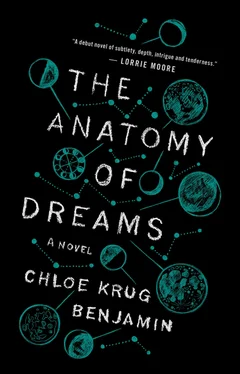14. MADISON, WISCONSIN, 2005
Like all good liars, I took pride in my ability to deceive and thought it seamless. I painted my canvases black with a zealous attention to detail, allowing no trace of the original painting to shine through. Those covered-up paintings were works in themselves, as layered and intentional as what was underneath. There was only one painting I’d forgotten to black out: the one I had been working on when Thom called, on Christmas night. I’d shoved it behind the other four dark canvases and left it there.
One afternoon in January, I came inside after scraping ice off the porch, an old shovel in hand, when I noticed that Gabe wasn’t in the kitchen where I’d left him. With the specialized intuition of the paranoid, which told me that the only possible outcome was the one I most feared, I knew he was in the attic.
I pounded up the stairs and pushed open the door. He stood at the window, light striking his cheekbones. The four black paintings were scattered on the ground like fallen soldiers. In Gabe’s hands was the painting of Thom.
“You didn’t tell me you were doing this,” he said without looking up at me.
“It’s a new project.”
“I see.”
He held the painting up to the light. My stomach tumbled, for I knew what it showed: Thom and me on the floor of the attic, our bodies making angles as we rocked together. But I had painted it the way I always did my dreams—narrative on top of narrative, the same scene sketched over as more of it came back to me—and now the lines were dizzying, almost indecipherable. Gabe squinted at it, straining to tease out the piece’s meaning. A test: how well had I hidden it away?
“What is it?” he asked, finally.
“I don’t know. I was just messing around. Playing with color and lines.”
But maybe I had wanted him to find the painting; maybe it was I who was testing him. How much do you know about me, Gabe? How far will you go to know it? He hadn’t put the painting down; he was staring at the lower left corner, where I had painted Thom’s cast-off glasses. The glinting little lenses, the black temples folded shut.
“Those glasses look familiar,” he said.
“Really?” I blinked. “Huh.”
He put the painting down on the ground and brushed his hands on his pants. When he looked up again, his face was fixed.
“They’re Thom’s,” he said. “Funny, isn’t it?”
I thought I had won, but now I saw I was wrong. Gabe was feigning disinterest, something he only bothered to do when he was supremely, painfully interested. He wouldn’t give up without a fight.
“Why funny?”
Gabe ignored this. I crouched and began to clean up the foam peanuts that had fallen out of a large, tipped-over box. He was silent, watching me.
“Is Thom really that interesting to you?”
“That’s a ridiculous question. First of all, Thom doesn’t have a monopoly on black-rimmed glasses. And secondly, they’re only a small part of the painting.”
“Right. I forgot to mention the crazy lines zigzagging all over the place. And the two naked bodies.” He laughed hollowly. “I’m not blind.”
“Gabe.” I released a long breath. “It was a dream, okay? I had this weird dream about Thom, and it freaked me out. I came up here to process it.”
“A dream. So you’re still remembering them.”
“I guess so. Parts of them, anyway.” I crossed my arms. “I thought you’d be happy I’m painting again.”
“You’re changing the subject. And you’re defensive.”
“Of course I’m defensive. You’re acting like I’ve done something wrong, like I’ve betrayed you, but I can’t help what I dream. And don’t I have the right to—to artistic freedom?”
I was bluffing; in truth, I felt just as guilty as Gabe thought I was. But he believed me, or he wanted to—I could see it in his face. His jaw softened, and he exhaled.
“I’m sorry.” He shook his head, ran a hand through his thick brown hair. “I don’t know what’s wrong with me. I know you can’t help it.”
He walked out of the attic; his shoulder brushed mine as he passed me, and then I heard his heavy, quick footsteps on the stairs. A moment later, the screen door gasped open, rattled shut. He had left.
In my first year at Berkeley, I took a psychology course that focused on love. Most interesting to me was the section on communication between couples. I learned that even the slightest change of facial expression in one partner, a raised eyebrow or a curled lip, can be enough to trigger an increase in the heart rate and adrenaline of the other. Even more striking was the fact that couples begin to look alike as they age: their faces are quite literally shaped by shared experience. It was clear that couples speak with their bodies, not just their voices; that the body is confused in its allegiances; and that, sometimes, the body betrays the mind of its owner in order to communicate something to the partner—an insurgent rushing across party lines with a letter in hand.
I should have been relieved when the conversation was over, but I wasn’t. Gabe’s unease had amplified my own alarm, for I could no longer deny that my dreams were beginning to bulge into my days. Time was no longer fastened to my life; it had become unsewn, a hanging hem, a sibling whose days had once been braided with mine but had since moved on. I tumbled into morning feeling disoriented and incongruous, like a nocturnal creature blinking in the harsh, wrong light of dawn. Sometimes my muscles were sore, my breath short, as if I’d clenched them through the night. At other times, a faint, ebbing pleasure washed through my body.
My dreams of Thom had grown richer and more detailed, and they had a sensory, physical weight that stayed with me when I woke up: Thom’s scissored legs around me, warm and long, sparsely patched with hair; the knobs and hollows of his face pressed against mine, soft eye sockets, ridge of nose, as he whispered something to me—a song— For there’s a change in the weather, a change in the sea. My walk will be diff’rent, my talk and my name . . . It was an old big-band song from the 1940s, a Benny Goodman song, and where had I heard it before? For it to occur in my dream, I knew, I had to have heard it somewhere. But when I played the song online, in the office with the door shut, it reminded me of Thom, only Thom, nothing more.
Until now, I had felt helpless, resigned to the dreams as they came. Years ago, I had given up on the lucidity exercises Keller taught us in Snake Hollow. But what if I tried again? If I could train myself to be lucid—if I could watch the old machinery of my subconscious creak to life while standing apart from it—perhaps the dreams would lose their power. If I could name them, I might be able to disarm them. Maybe I could even control them.
That night, lying in bed, I took inventory of the things around me: the bedroom door, slightly ajar; outside my window, a yawn of moon; hanging from my nightstand, the cotton skirt from which I’d scrubbed a stain the night before. When I see my hand in my dream, I will know I am dreaming , I thought as Gabe snored lightly next to me. I reminded myself of the dream signs: broken electronics, impossible feats of physics, the dead. And when I emerged in a dream, minutes or hours later, I looked for them.
I was never aware of how the dreams began. Instead, I became conscious partway through, and it was almost like waking—slowly my eyes would seem to open and that musty, subterranean world materialized again, always the basement, its cracked floorboards and dusty bulb. Lights didn’t turn on in dreams, and so it was light I would start with. But when I reached for the bulb’s dangling chain one night, Thom stopped me.
Читать дальше












